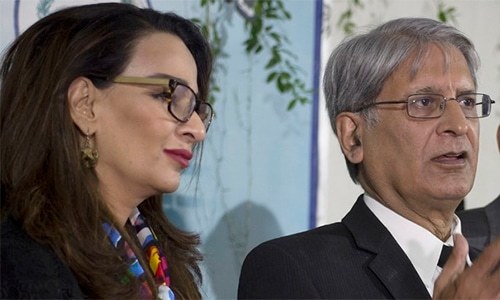ISLAMABAD: The government has decided in principle to give another extension to the military courts for a period of two years and draft laws in this regard have already been prepared amidst confusion over the expiry time of these courts, sources privy to the development told Dawn here on Tuesday.
According to the sources, the two ministries concerned — law and interior — had already initiated the process of reinstating the military courts even before the expiry of their two-year term which, according to some of the treasury and opposition members, took place on Jan 6; others claim that the courts will cease functioning on March 30.
Also read: Yet another extension?
The sources said the government had decided to engage the opposition parties on the issue during the upcoming session of the National Assembly starting next week as it did not have the required two-thirds majority in both houses of parliament to get the constitutional amendment bill passed for this purpose.
Fawad says PTI will seek support of PPP and PML-N as it lacks two-thirds majority in parliament
“Yes, there has been some development in this regard and drafts have already been prepared. But the problem is that we cannot do it without the support of the opposition parties,” said a ruling Pakistan Tehreek-i-Insaf (PTI) member privy to the process.
Minister for Information Fawad Chaudhry, when contacted, confirmed that they had decided to contact the two main opposition parties — Pakistan Peoples Party (PPP) and Pakistan Muslim League-Nawaz (PML-N) — over the issue as without their support the period of the military courts could not be extended.
Mr Chaudhry, who is a lawyer by profession, claimed that they had sufficient time to develop a consensus on the issue as the period of the military courts would expire in March this year since the 23rd Constitution Amendment had been assented to by the president on March 31, 2017 after its passage from parliament.
He said the PTI believed that the military courts set up through a political consensus under the National Action Plan (NAP) against terrorism in 2015 had delivered and even the Supreme Court had upheld the establishment of these courts. The minister said the military courts had been established to deal with the “extraordinary situation” in the wake of terrorism in the country and they had played a major role in eliminating terrorism from the country.
He said that if opposition parties believed that there was no need for giving extension to the courts as there was no extraordinary situation in the country, then definitely the government would not be in a position to move the constitutional amendment bill. He was of the view that for such a vital legislation, a national consensus was needed.
On the other hand, the PPP, which had previously taken a tough stance on the issue and extended only conditional support to the previous PML-N government over the issue, is again opposed to the idea of giving an extension to the military courts to try civilians on terrorism charges.
Talking to Dawn, PPP general secretary Farhatullah Khan Babar said the party had during its Central Executive Committee (CEC) meeting in Naudero on Dec 26 already declared through a resolution that parliament should not give another extension to the military courts. He said PPP chairman Bilawal Bhutto-Zardari on a number of occasions had publicly stated that his party was not in favour of extending the military courts’ period.
When his attention was drawn to the fact that previously too the party had initially opposed the idea but finally it had to succumb to pressure, Mr Babar said this time it seemed difficult as the party’s CEC had recently passed a resolution in this regard. The CEC meeting, he said, had been jointly presided over by Mr Bhutto-Zardari and Asif Ali Zardari. Responding to a question, he said that so far the government had not made any contact with the PPP over the issue.
Similarly, spokesperson for the PML-N Marriyum Aurangzeb, when contacted, said that so far her party had not held any in-house consultation on the issue. She, however, said that keeping in view “inefficiency” of the present government to run legal and judicial matters, they were expecting that the PTI would definitely seek an extension to the military courts. She refused to give a specific response whether her party would support or oppose any such move, saying that they would make any such decision after an internal discussion on the matter.
The military courts were established and granted permission to try civilians charged with terrorism first time in January 2015 after a terrorist attack on the Army Public School in Peshawar in December 2014. The courts remained non-functional from Jan to March 2017 after the expiry of the two-year constitutional cover given to them.
Initially, not only the opposition parties, but the government allies of that time — the JUI-F and PkMAP — were also opposed to the idea of giving extension to the military courts.
The National Assembly has recently been informed that the military authorities have to decide 185 terrorism-related cases before expiry of their two-year term in March.
In a written reply to a question raised by MNA Mohsin Dawar, Defence Minister Pervez Khattak had informed the National Assembly that since the launch of the military operation Zarb-i-Azb, the interior ministry had referred a total of 717 cases of terrorism to the military courts. Of the total cases, 185 are still under process and they have to be decided before March next year when the two-year term of the courts will expire.
Giving details of the cases decided by the military courts, the minister said that a total of 478 cases had been decided, which meant that the conviction rate of the cases was more than 60 per cent. He said that a total of 284 convicts had been awarded death sentences and 56 of them had already been executed. Similarly, he said, 192 convicts had been awarded rigorous imprisonment, two accused acquitted and 54 cases dropped due to technical reasons.
Published in Dawn, January 9th, 2019
















































